Blogging has evolved from just quality content to SEO optimized social content. Writing quality content is must, but at the same time it’s good to have the properly optimized article to rank well in search engines. This is where, on page SEO comes into the picture. On the page, SEO starts with selecting the right keyword for your post, and the keyword should be one which have search volume. That means people are searching for that particular keyword.
Here is one question you should ask yourself: Even though I’m writing quality content, why I’m unable to drive enough traffic from search engine? Well, I’m sure Google doesn’t have anything against you until unless you are doing Black Hat SEO. The reason is, you are not writing on topics that people are searching for. Or even you are writing on a topic that is trending, but you making it hard for search engine bots to understand your content. I have already covered how to write SEO optimized articles in WordPress, and today you will learn how to use Keyword planner tool for researching Keyword.
To start with; if you are not sure, why Keyword search before writing a blog post, you should read my post on Importance of Keyword in SEO.
What is Keyword research?
Lets get to know the basics first. In layman language, Keyword research is the process of identifying Keywords, which get the good amount of search volume/month. For example, Keyword: “KeywordSpy”, “Website SEO optimization tip” and so on. The idea behind performing a research is to, find the keywords that can give maximum traffic and comes with less competition. I will discuss competition part later in this post. For example: When you do an exact match search: “WordPress SEO plugins”, “Best WordPress Plugins for SEO ” both gives the entirely different picture in terms of traffic.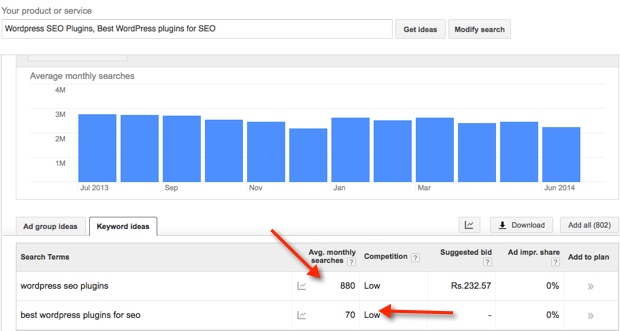
By doing a complete Keyword search, you will be able to find keywords to drive targeted traffic, more revenue and more niche traffic. More over, when you are planning to target a small niche, for example “Bug Spray”, doing a Keyword search will help you to find many new Keywords that you might be missing out. You can also analyze competitor site and find keywords which they were ranking for. Doing a comprehensive Keyword research based on the data, can drive immense traffic to your site. And by the end, the sale happens only when you are getting targeted traffic. Isn’t it?
What is Google Keyword Planner tool:
Google Keyword tool is an official product from Google, which gives us a traffic estimation of our target Keywords and also help in finding more relevant and related Keywords for your niche. Few Important things to know:- You need to have a Google Adwords account to use Google Keyword planner tool. It’s free, and you don’t need to spend any money to use this tool. You can simply create an Adwords tool and start using it.
- You can also search for existing Google Adwords coupons to create one free account for yourself, and start using Keyword planner tool.
- This tool is created to target Adwords advertisers, but it still give a great deal of information when it comes to finding the right keyword for your blog and articles.
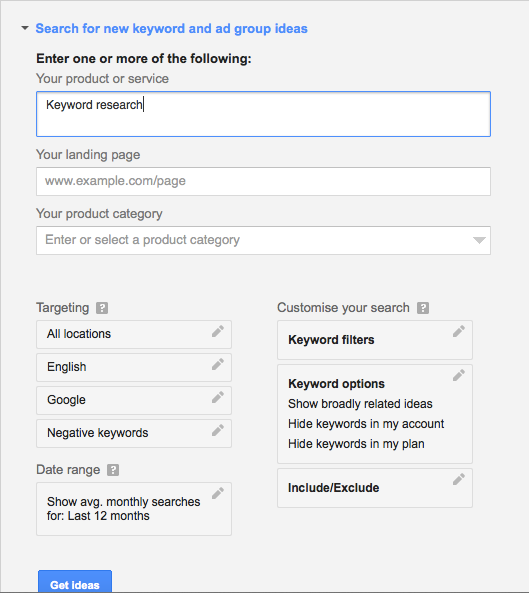
1) Enter your product or services:
This is the place where you will put your target Keywords. For
example, my next post in on Keyword research, and I’m not sure what
keyword I should be targeting that post for, I will do some searches
based on my knowledge like you see in example, and it shows me results
globally and local search. The idea here is to find a Keyword that has
good traffic but low competition. If you are working on a blog for the long-term goal, you can also target high competition Keyword, using resource pages. For ex: WordPress guide. It makes take time before you see your keyword ranking at the good position. Below image illustrates the difference between Broad search, Exact search and phrase search.
2) Search type:
This is one important column that you should be taking care of. There are three options for search type:- Broad
- Exact
- Phrase
3) Advanced option and filter:
This feature is set to add more filters into your search. For example
Country search volume, Language and target device (Computer or mobile
devices). Depending upon your target audience, you can set everything
including the category.
4) Understand Keyword tool column:
Notice the pointer 4 in the above image and now, understand the meaning of each column.- Competition: Just to clear one myth about this tool, competition field doesn’t show how hard and easy it’s to rank for that Keyword. In fact, it shows the competition among advertisers bidding on that keyword. So, if you see “low” for a great keyword, mark it and later we will see how we can easily analyze the competition.
- Global monthly search : Global monthly search shows the average of search happened in last 12 months globally.
- Local monthly search : It shows the search volume based on your filter. For example, in above image I have applied filter for U.S as country and notice the huge difference between global and local search volume.
- Approximate CPC : This column shows approx. CPC (Cost per click), for an advertiser. Many SEO guru’s recommend to use this column to find Adsense CPC Keywords It’s a good idea to pick high CPC keywords, where advertisers are bidding more but with low competition.
Performing Keyword research using Google Keyword tool:
I hope this must have given you a basic understanding of Keyword tool by Google works and now, we will move to real deal here. Our target is to find some low competitive but high-medium traffic Keyword using Google search, Google Keyword research tool and Traffic Travis. We will be using Traffic Travis to analyze the competition and if you are new to it, read Traffic Travis review. Now, when you start with Keyword research, here is a quick question: What is better? Getting 100 un-targeted visitors or 10 targeted one? If your answer is “Targeted”, then don’t leave those Keyword with low traffic. Since it’s relevant to your niche, in long run it will help you. Make sure to check “Google traffic trend” too, which will help you to check your target keyword traffic pattern over the time.
Discover Keyword using Google Instant search:
Google instant search is my first basis of finding a
perfect Keyword. It’s more like a Keyword discovery tool, which you can
use to generate tons of ideas. Though, you can’t actually use all of
them, but for initial step it’s good to brain storm some ideas for K/w
research. Put any Keyword related to your niche, for example, I started
typing “SEO Keywo” and Google instant search suggested search results.
Depending upon your post type, you can pick couple of them which make
sense to you. Look at this screenshot: 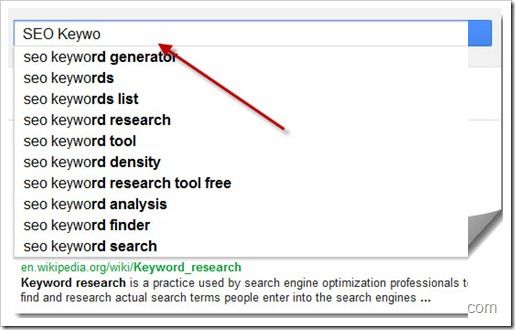 Once you have found 3-4 such Keywords, start adding it to Google
Keyword suggestion tool and perform a search. So I picked two keywords
from the list: “SEO Keyword Search” & “SEO keyword research” as both
are similar and make sense for my niche, and I can come up with a post
on that. Now next step is to find if these two Keywords are going to do
any benefit in terms of traffic, or just going to be another article
with not much value from traffic POV. Lets move on to next step:
Once you have found 3-4 such Keywords, start adding it to Google
Keyword suggestion tool and perform a search. So I picked two keywords
from the list: “SEO Keyword Search” & “SEO keyword research” as both
are similar and make sense for my niche, and I can come up with a post
on that. Now next step is to find if these two Keywords are going to do
any benefit in terms of traffic, or just going to be another article
with not much value from traffic POV. Lets move on to next step:
Keyword search analysis:
Now, I will put both the Key words in search tool and perform a
search, it will give me details for search type I’m performing and also
show relevant Keyword ideas. Now, that is keyword goldmine for you, as
it will let you find many relevant Keywords that you can target in same
post or else can come up with a follow-up posts.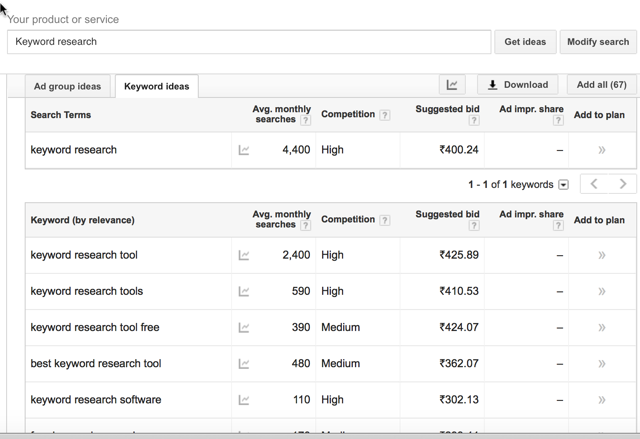
I usually target 2-3 Keywords/post. You can create your own SEO strategy depending upon your post quality and length. So, for the information sake, we have selected only Two keywords as shown in above picture and it’s time to check, which one of them is less competitive. Before that, you can change your filter to see if your target Keyword has any exact match type or not.
Checking Keyword competition using Traffic Travis:
There are many Keyword competition checker tool and some of them which I usually use are SEOmoz Pro and Traffic Travis. T.T being a desktop solution is easier to use. Open Traffic Travis and go to SEO > Competition tab and enter both your Keywords and perform a search. You will see a result like this:
As you can see here, according to competition checker tool, “SEO keyword search” is easier to rank. These tools, consider many factors that includes domain age, backlinks, on Page SEO, page rank, DMOZ submissions and many more factors. You can also click on “view details” to see more detailed results for your competitor. Here is a detailed competition report for my target Keyword : (For first top 10 results)
 As you can see, from the result on how important it is to have Keywords
in your Title, description and H1 tag. Along with above mentioned
points, backlink
and social media promotion is one major factor for better ranking. Also,
my suggestion book your domain for longer time-period, like 2-3 years.
As you can see, from the result on how important it is to have Keywords
in your Title, description and H1 tag. Along with above mentioned
points, backlink
and social media promotion is one major factor for better ranking. Also,
my suggestion book your domain for longer time-period, like 2-3 years.
What next?
So now, we have one keyword with us, and similarly you can find many
keywords related to your niche. It might be the little time-consuming
but it’s worth more than spending un-targeted ten posts. Now, your next
target should be writing a Keyword optimize article (SEO copy-writing), and you can refer to our earlier guide on OnPage optimization.Never forget, this Keyword research is just a primary steps, and real magic starts with your content. Moreover, never try to get traffic on the wrong keyword, as it will affect your overall blog performance in terms of Avg. Time on site and bounce rate. For your old blog articles, if you have not optimized them for any Keyword, you can use Google analytic data, any software for
For your old blog articles, if you have not optimized them for any Keyword, you can use Google analytic data, any software for Keyword research and work on re-optimization for Keyword. I did this for almost 30% of my old posts, and they started ranking in 1-2 page in ranking.
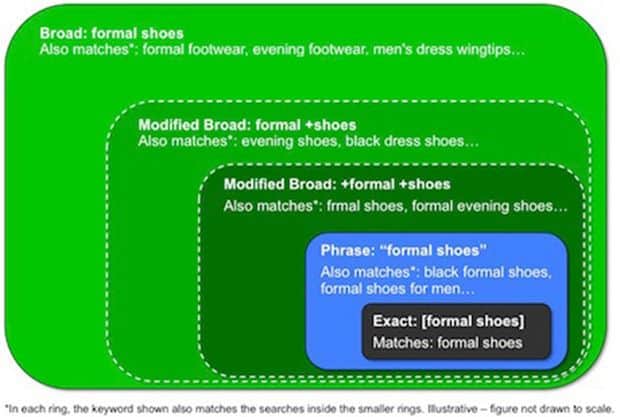








No comments:
Post a Comment